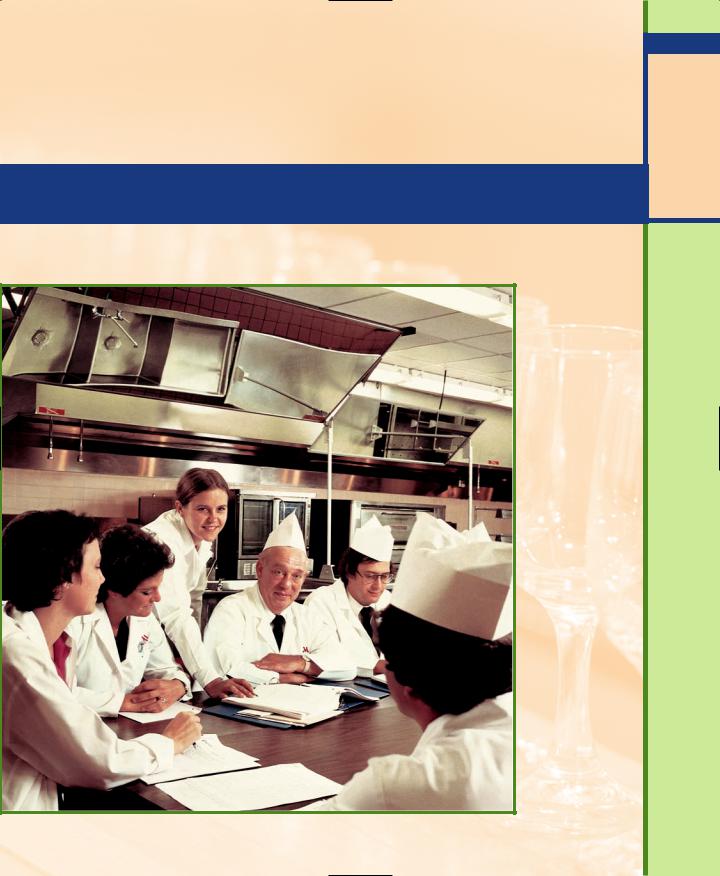
- •CONTENTS
- •PREFACE
- •Content—Benefits for Students
- •Content—Benefits for Instructors
- •Features of the Book for Students and Instructors
- •Supplementary Materials
- •Acknowledgments
- •What Is Hospitality Management?
- •The Manager’s Role in the Hospitality Industry
- •Why Study in a Hospitality Management Program?
- •Planning a Career
- •Employment as an Important Part of Your Education
- •Getting a Job
- •Employment at Graduation
- •The Outlook for Hospitality
- •Summary
- •Managing Change
- •Demand
- •Supply
- •Workforce Diversity
- •The Impact of Labor Scarcity
- •Summary
- •The Varied Field of Food Service
- •The Restaurant Business
- •The Dining Market and the Eating Market
- •Contemporary Popular-Priced Restaurants
- •Restaurants as Part of a Larger Business
- •Summary
- •Restaurant Operations
- •Making a Profit in Food Service Operations
- •Life in the Restaurant Business
- •Summary
- •Chain Restaurant Systems
- •Independent Restaurants
- •Franchised Restaurants
- •Summary
- •Competitive Conditions in Food Service
- •The Marketing Mix
- •Competition with Other Industries
- •Summary
- •Self-Operated Facilities
- •Managed-Services Companies
- •Business and Industry Food Service
- •College and University Food Service
- •Health Care Food Service
- •School and Community Food Service
- •Other Segments
- •Vending
- •Summary
- •Consumer Concerns
- •Food Service and the Environment
- •Technology
- •Summary
- •The Evolution of Lodging
- •Classifications of Hotel Properties
- •Types of Travelers
- •Anticipating Guest Needs in Providing Hospitality Service
- •Service, Service, Service
- •Summary
- •Major Functional Departments
- •The Rooms Side of the House
- •Hotel Food and Beverage Operations
- •Staff and Support Departments
- •Income and Expense Patterns and Control
- •Entry Ports and Careers
- •Summary
- •The Economics of the Hotel Business
- •Dimensions of the Hotel Investment Decision
- •Summary
- •The Conditions of Competition
- •The Marketing Mix in Lodging
- •Product in a Segmented Market
- •Price and Pricing Tactics
- •Place—and Places
- •Promotion: Marketing Communication
- •Summary
- •The Importance of Tourism
- •Travel Trends
- •The Economic Significance of Tourism
- •The United States as an International Tourist Attraction
- •Businesses Serving the Traveler
- •Noneconomic Effects of Tourism
- •Summary
- •Motives and Destinations
- •Mass-Market Tourism
- •Planned Play Environments
- •Casinos and Gaming
- •Urban Entertainment Centers
- •Temporary Attractions: Fairs and Festivals
- •Natural Environments
- •On a Lighter Note. . .
- •Summary
- •Management and Supervision
- •The Economizing Society
- •The Managerial Revolution
- •Management: A Dynamic Force in a Changing Industry
- •What Is Management?
- •Summary
- •Why Study Planning?
- •Planning in Organizations
- •Goal Setting
- •Planning in Operations
- •The Individual Worker as Planner
- •Long-Range Planning Tools
- •Summary
- •Authority: The Cement of Organizations
- •Departmentalization
- •Line and Staff
- •Issues in Organizing
- •Summary
- •Issues in Human-Resources Management
- •Fitting People to Jobs
- •Recruiting
- •Selection and Employment
- •Training
- •Retaining Employees
- •Staff Planning
- •Summary
- •The Importance of Control
- •Control and the “Cybernetic Loop”
- •Tools for Control
- •Summary
- •Leadership as Viewed by Social Scientists
- •Why People Follow
- •Leadership Theories
- •Communication
- •The Elements of Leading and Directing
- •Developing Your Own Leadership Style
- •Summary
- •A Study of Service
- •Rendering Personal Service
- •Managing the Service Transaction
- •How Companies Organize for Service
- •Summary
- •INDEX

Summary 603
Summary
In a service-oriented field such as the hospitality industry, human-resources management is especially important. Also, because the hospitality industry usually spends
so much of its income on wages, selecting the right employees is essential.
First, the employer must define the right type of person for a particular job, in terms of both physical and mental abilities. Second, that kind of person must be recruited for the job, using internal and external sources to find suitable candidates. When a pool of applicants has been gathered, some must be selected, by means of the application, an interview, and a reference check. Then comes the employee’s induction, or orientation to the job and to fellow employees. Training is necessary and generally involves on-the-job training.
Retaining people and planning staffing needs are also important. In regard to the latter, we talked about using part-time employees and computerized scheduling.
Key Words and Concepts
Personal service |
Advertising |
Payroll cost |
Application |
Job description |
Selection |
Job specifications |
Interview |
Recruiting |
Orientation |
Internal sources |
Training |
Part-time |
Retaining employees |
External sources |
Staff planning |
Employment agencies |
Schedule |
Review Questions
1.What has given rise to the current labor shortage?
2.What kinds of qualifications should be considered when recruiting an employee for the dish room? As a server? As a supervisor?
3.Describe some of the internal and external sources that employers use to find employees.
4.What does orientation to a job involve, and why is it important?
5.Why do some companies prefer to hire people with no experience?

604Chapter 18 Staffing: Human-Resources Management in Hospitality Management
6.Explain why management training is especially important before opening a new operation.
7.What are the advantages of hiring part-time employees? The disadvantages?
Internet Exercises
1.Site name: Directory of Hotel and Restaurant Homepages
URL: www.wku.edu/,hrtm/hotlrest.htm—Hotels, restaurants, and food management
companies www.ehotelier.com/browse/chains.php—Hotel chains www.unlv.edu/Tourism/dining—Restaurants
Background information: These directories list the Web addresses for numerous hotel and restaurant chains.
Exercises: Select a hotel and a restaurant from the list and browse their Web sites. Determine whether they offer employment opportunity information on their Web pages.
a.What job opportunities are listed on their Web pages?
b.What training do they offer for entry-level managers?
c.Do they list job requirements so one would know what the job entails?
d.Do you consider this an effective method for recruiting employees? Why or why not?
e.What is the difference between the recruiting efforts of the hotel versus the recruiting efforts of the restaurant?
2.Site name: Newspapers.com
URL: www.newspapers.com
Background information: Newspapers.com is a directory of all the newspapers in the
United States regardless of size. You can search for a newspaper by title, state, or city. The directory provides the name of the newspaper plus a hot link to the newspaper’s Web site.
Exercises: Choose a newspaper, perhaps a newspaper from your hometown or state. Search the classified advertisements for hotel and/or restaurant management jobs.
a.Did you find the advertisements informative?
b.What were the strengths and weaknesses of the advertisements you looked at?
c.Print out the best and worst advertisements you found, and discuss them in class.
d.Based on what you have seen, what information would you have included in a classified advertisement to attract potential candidates for management positions?

Summary 605
3.Site name: Free Management Library: Online Guide to Staffing
URL: http://www.managementhelp.org/staffing/staffing.htm
Background information: The Free Management Library provides easy-to-access, clutter-
free, comprehensive resources regarding the leadership and management of yourself, other individuals, groups, and organizations. The content is relevant to the vast majority of people, whether they are in large or small for-profit or nonprofit organizations. Over the past ten years, this library has grown to be one of the world’s largest, best organized collections of these types of resources.
Exercises:
a.Choose one of the “chapters” on the above Web site that is of interest to you. Lead a class discussion on the management function of staffing in an organization and describe why this information would be important to a hospitality manager.
Notes
1.Restaurants USA, September 2000, pp. 14–19.
2.Margaret Sheriden, “Head Count,” Restaurants & Institutions, January 1, 1998, p. 62.
3.Restaurants & Institutions, March 15, 1993, p. 121.
4.Joan Viewager, “Research Summary: Exploring the Effectiveness of Hourly Employee Training,” Proceedings of the Twenty-First Annual Chain Operators Exchange, (Chicago: International Foodservice Manufacturers Association, 1994).
5.Amy Zuber, “Buffets, Inc. Aims to Keep Managers with $20K Incentive Program,” Nation’s Restaurant News, October 27, 1997.

The Hospitality Industry
(Courtesy of Marriott International.)

C H AC PHTAEPRT ENRI NOENTE E N
ControlThe Hospitalinitality
IndustryManagementand You
The Purpose of this Chapter
f you’ve ever found yourself working on too many projects at once and suddenly felt the need to
Isit down and figure out just what you’re getting done, you will understand how important it is to control projects before they begin to control you. A hospitality system has so many varied activities that the control function is absolutely essential to its efficiency and success. In this chapter, therefore, we will explore the ways in which organizations measure their results against goals—how they
appraise exactly what they are getting done.
Control is too often thought of as exclusively something for the accountants to worry about. However, nothing could be further from the truth. The information from control systems exists, first and foremost, to guide management action. In fact, in hospitality operations, control information often does not even enter the accounting stream; it may not even be numerical. Although whole courses—indeed, entire curricula, such as accounting—are devoted to a detailed study of control, our purpose here is more basic: We want you to see control as the heart of hospitality management.
THIS CHAPTER SHOULD HELP YOU
1.Explain how control relates to other functions of hospitality management.
2.Provide an example of how control functions as a future-oriented process and as a basis for management action.
3.Identify and describe four common characteristics of an effective control system.
4.Identify the two principal financial accounting statements used to report results of business operations, and explain their managerial purpose.
5.Identify the principal concerns of managerial accounting in the hospitality industry, and describe the tools used to address them.
6.Define decision accounting, and explain how it differs from financial and managerial accounting.
